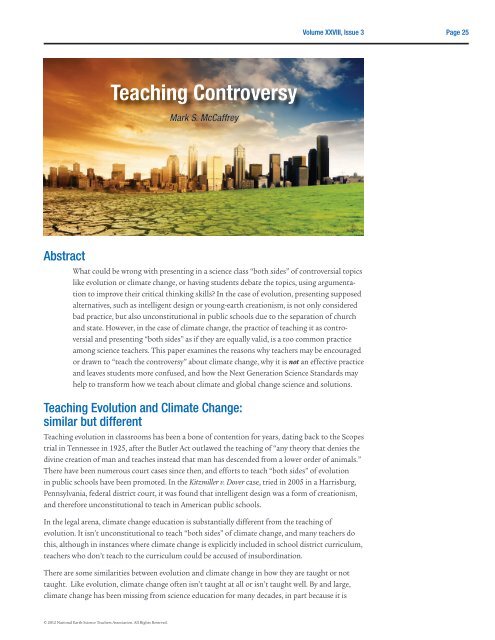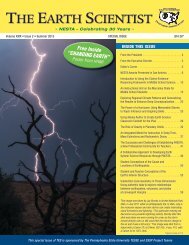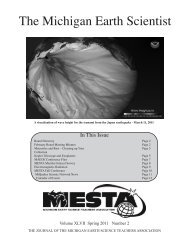The Earth Scientist
Fall 12.pdf - NESTA
Fall 12.pdf - NESTA
- No tags were found...
Create successful ePaper yourself
Turn your PDF publications into a flip-book with our unique Google optimized e-Paper software.
Volume XXVIII, Issue 3<br />
Page 25<br />
Teaching Controversy<br />
Mark S. McCaffrey<br />
Abstract<br />
What could be wrong with presenting in a science class “both sides” of controversial topics<br />
like evolution or climate change, or having students debate the topics, using argumentation<br />
to improve their critical thinking skills? In the case of evolution, presenting supposed<br />
alternatives, such as intelligent design or young-earth creationism, is not only considered<br />
bad practice, but also unconstitutional in public schools due to the separation of church<br />
and state. However, in the case of climate change, the practice of teaching it as controversial<br />
and presenting “both sides” as if they are equally valid, is a too common practice<br />
among science teachers. This paper examines the reasons why teachers may be encouraged<br />
or drawn to “teach the controversy” about climate change, why it is not an effective practice<br />
and leaves students more confused, and how the Next Generation Science Standards may<br />
help to transform how we teach about climate and global change science and solutions.<br />
Teaching Evolution and Climate Change:<br />
similar but different<br />
Teaching evolution in classrooms has been a bone of contention for years, dating back to the Scopes<br />
trial in Tennessee in 1925, after the Butler Act outlawed the teaching of “any theory that denies the<br />
divine creation of man and teaches instead that man has descended from a lower order of animals.”<br />
<strong>The</strong>re have been numerous court cases since then, and efforts to teach “both sides” of evolution<br />
in public schools have been promoted. In the Kitzmiller v. Dover case, tried in 2005 in a Harrisburg,<br />
Pennsylvania, federal district court, it was found that intelligent design was a form of creationism,<br />
and therefore unconstitutional to teach in American public schools.<br />
In the legal arena, climate change education is substantially different from the teaching of<br />
evolution. It isn’t unconstitutional to teach “both sides” of climate change, and many teachers do<br />
this, although in instances where climate change is explicitly included in school district curriculum,<br />
teachers who don’t teach to the curriculum could be accused of insubordination.<br />
<strong>The</strong>re are some similarities between evolution and climate change in how they are taught or not<br />
taught. Like evolution, climate change often isn’t taught at all or isn’t taught well. By and large,<br />
climate change has been missing from science education for many decades, in part because it is<br />
© 2012 National <strong>Earth</strong> Science Teachers Association. All Rights Reserved.






